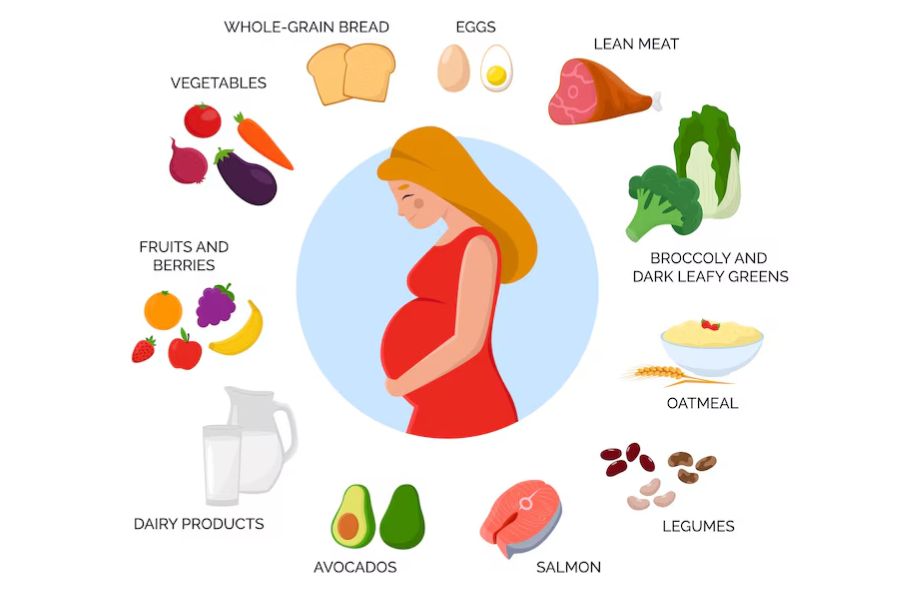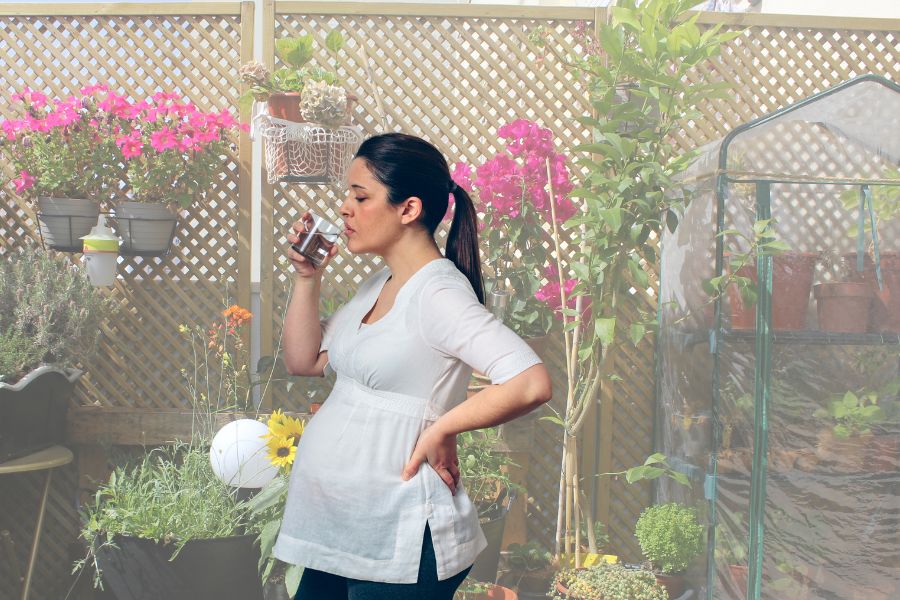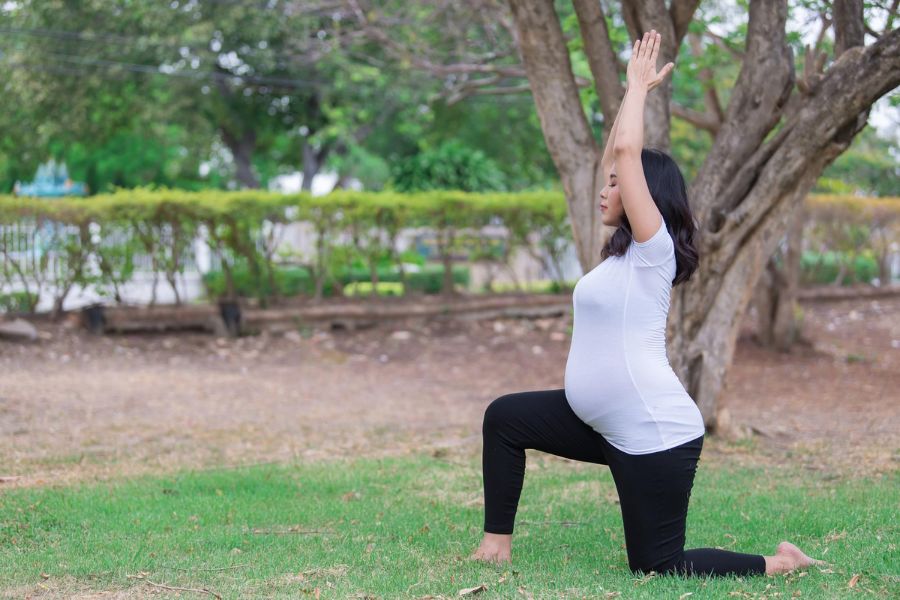- 03rd Sep 2024
- srisriholistichospitals.com
- Comment: 0
- blog
Nutrition: Building a Healthy Foundation
Hydration
- The benefits of staying hydrated include improved digestion, increased energy, and amniotic fluid maintenance.
- Tips for increasing water intake include flavoured water, herbal teas, and the need of avoiding sugary beverages.
Foods to Avoid
- A list of items to avoid includes raw or undercooked meats, mercury-rich fish, unpasteurized dairy products, and meals containing potentially dangerous bacteria.
- The hazards linked with these meals, as well as their possible effects on pregnancy.
Balanced Diet for Pregnancy: Key Nutrients and Guidelines
- A well-balanced diet rich in macronutrients and micronutrients is essential during pregnancy.
- The primary focus should be on consuming a variety of fruits, vegetables, whole grains, lean proteins, and healthy fats.
- Folic acid is particularly important for preventing birth abnormalities, and it can be found in leafy greens, fortified cereals, and supplements.
- Pregnant women also need increased iron intake to prevent anaemia, making iron-rich foods crucial.
- Calcium and Vitamin D play an essential role in maintaining bone health for both mother and baby, with dairy products being a primary source.
Hydration
- Staying hydrated during pregnancy offers numerous benefits, such as improved digestion, increased energy levels, and the maintenance of amniotic fluid.
- To boost water intake, consider options like flavoured water and herbal teas, and avoid sugary beverages. Foods to Avoid
- Certain foods should be avoided during pregnancy, including raw or undercooked meats, mercury-rich fish, unpasteurized dairy products, and items that may contain harmful bacteria.
- These foods pose potential health risks and could negatively affect pregnancy outcomes.
Physical Activity: Staying Active and Fit
Benefits of Regular Exercise During Pregnancy
- Engaging in moderate exercise during pregnancy provides numerous physical and mental health benefits. It helps reduce stress, regulates weight gain, boosts mood, and prepares the body for childbirth.
- Suitable activities for pregnant women include walking, swimming, prenatal yoga, and low-impact aerobics.
- Following these guidelines for exercise frequency and duration can support a healthy pregnancy.
Exercises to Avoid
- Pregnant women should avoid activities that pose potential risks, such as heavy lifting, high-impact sports, and exercises that increase the risk of falling.
- Modifying existing workout routines by adjusting the intensity and technique is essential to accommodate the body’s changing needs during pregnancy.
Pelvic Floor Exercises
- Pelvic floor exercises are crucial for strengthening the muscles that support the bladder, uterus, and bowels.
- Practising Kegel exercises during and after pregnancy can help maintain pelvic health, improve bladder control, and support recovery after childbirth.
Sleep and Rest: Prioritising Restful Sleep
The Importance of Adequate Sleep During Pregnancy
- Pregnancy can significantly affect sleep patterns due to hormonal changes, physical discomfort, and frequent urination.
- It is recommended that pregnant women aim for 7-9 hours of sleep each night to promote overall wellness and support their body’s changing needs.
Sleep Positions and Comfort Tips
- Optimal sleep positions vary during different stages of pregnancy, but sleeping on your left side is generally advised for better blood flow.
- To enhance sleep quality, consider using pillows to support your body, establishing a relaxing bedtime routine, and adjusting your sleep environment to maximise comfort.
Napping and Rest Periods
- Taking short naps during the day can help combat fatigue and improve energy levels.
- It’s also beneficial to incorporate rest periods into your daily routine, paying attention to your body’s signals and taking breaks when needed.
Stress Management: Nurturing Emotional Well-being
Relaxation Techniques
- Deep breathing, meditation, and prenatal massage are all techniques that can help reduce stress and increase calm.
- Integrating these practices into everyday activities can promote mental and physical well-being
Mindfulness and Positive Thinking
- The importance of mindfulness in remaining present and managing anxiety.
- Encourage positive thinking by focusing on the benefits of pregnancy and the excitement of welcoming a new baby.
Support Systems
- The significance of forming a solid support network, including family, friends, and pregnancy support groups.
- Communicate openly with loved ones and healthcare experts about your emotional needs and concerns.
Avoiding Harmful Substances: Protecting Your Baby’s Health
Alcohol and Smoking
- The dangers of alcohol and smoking during pregnancy include risks such as foetal alcohol syndrome, low birth weight, and developmental issues.
- It is crucial to completely avoid these substances and seek support for cessation if needed.
Caffeine Intake
- To ensure a healthy pregnancy, it’s recommended to limit caffeine consumption to 200 mg per day, roughly equivalent to one 12-ounce cup of coffee.
- Consider alternatives like herbal teas, decaffeinated coffee, or other healthy beverages.
Avoiding Environmental Toxins
- It’s important to reduce exposure to harmful chemicals, pollutants, and secondhand smoke.
- Implementing practical tips can help create a safe, toxin-free home environment for both mother and baby.
Medical Care: Ensuring a Healthy Pregnancy
Regular Prenatal Check-ups
- Attending all scheduled prenatal visits is essential for monitoring the baby’s development and addressing any health concerns.
- During these visits, expect procedures such as ultrasounds and blood tests, along with discussions about diet, exercise, and emotional well-being.

Vaccinations
- Staying up-to-date with necessary vaccinations, like the flu shot and Tdap vaccine, is crucial to protect both mother and baby.
- It’s important to discuss any concerns with your healthcare provider and understand the benefits of vaccination during pregnancy.
Monitoring and Managing Pre-existing Conditions
- Managing chronic conditions such as diabetes, hypertension, or thyroid disorders is vital during pregnancy.
- Working closely with healthcare providers to adjust treatment plans helps ensure optimal health outcomes for both mother and baby.
Education and Preparation: Empowering Yourself for Motherhood
Childbirth Education
- Attending prenatal classes offers numerous benefits, such as preparing for labour, learning about breastfeeding techniques, and understanding newborn care.
- These classes can be taken online or in person and provide valuable knowledge that helps reduce anxiety and boost confidence.
Financial and Practical Planning
- It’s essential to prepare for maternity leave by understanding your rights and planning your finances for time off.
- Additionally, budgeting for baby supplies, setting up a nursery, and considering long-term financial planning are crucial steps to ensure your growing family’s stability.
Embracing the Journey of Pregnancy
Pregnancy is a period of significant change and growth, not only physically, but also emotionally and mentally. By adopting these necessary lifestyle adjustments, you lay the groundwork for a healthy pregnancy and a joyful experience as you prepare to welcome your new baby. Remember that each pregnancy is unique, so listen to your body, seek advice from healthcare specialists, and make adjustments to meet your own needs. Accept this journey with confidence, knowing that you are doing the essential actions to support yourself and your baby during this incredible time.Frequently Asked Questions
Essential lifestyle changes during pregnancy include eating a balanced diet rich in nutrients, staying physically active with safe exercises, getting adequate rest, managing stress through relaxation techniques, and avoiding harmful substances like alcohol and tobacco.
Focus on a diet that includes a variety of fruits, vegetables, whole grains, lean proteins, and dairy products. Consider prenatal vitamins as recommended by your healthcare provider to ensure you're meeting all nutritional needs, including folic acid, iron, and calcium.
Safe exercises during pregnancy include walking, swimming, prenatal yoga, and low-impact aerobics. Always consult with your healthcare provider before starting any new exercise regimen to ensure it's suitable for your specific pregnancy.
Pregnant women should aim for 7-9 hours of sleep per night. To improve sleep quality, try using supportive pillows, establish a relaxing bedtime routine, and consider sleeping on your left side to enhance blood flow.
Effective stress management techniques during pregnancy include practising mindfulness and meditation, engaging in light physical activities like prenatal yoga, staying connected with supportive friends and family, and attending childbirth education classes to feel more prepared and informed.














